We have seen significant shifts in the American economy over the last couple of years, from the COVID pandemic to record-breaking inflation, even among the top online retailers. As the latest developments continue to unfold, ecommerce sales and online marketplaces set online records.
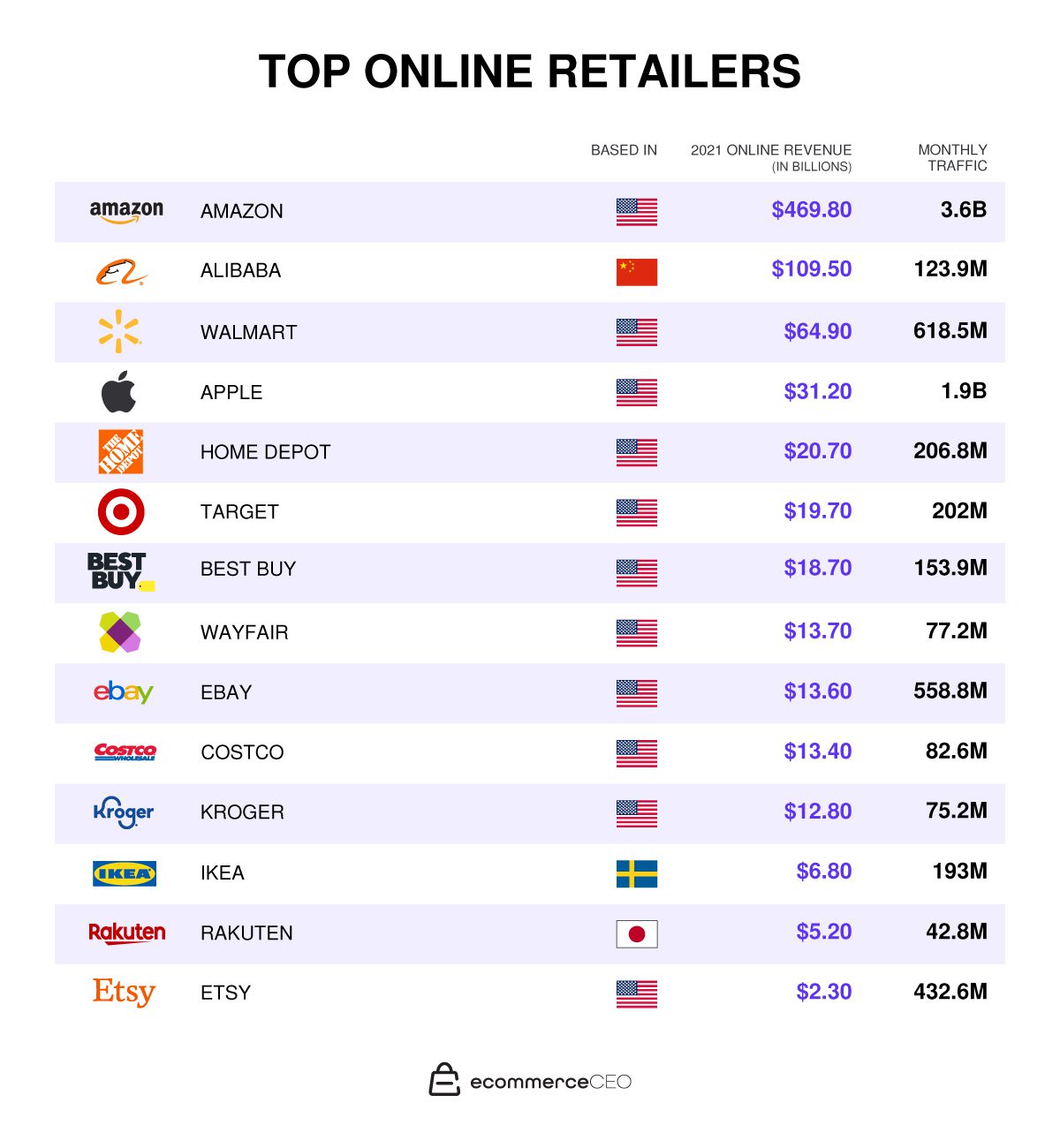
Is the Ecommerce Industry Growing?
The simple answer is yes. Consumers have continued to utilize online retailers in record numbers over the last couple of years, showing no sign of stopping.
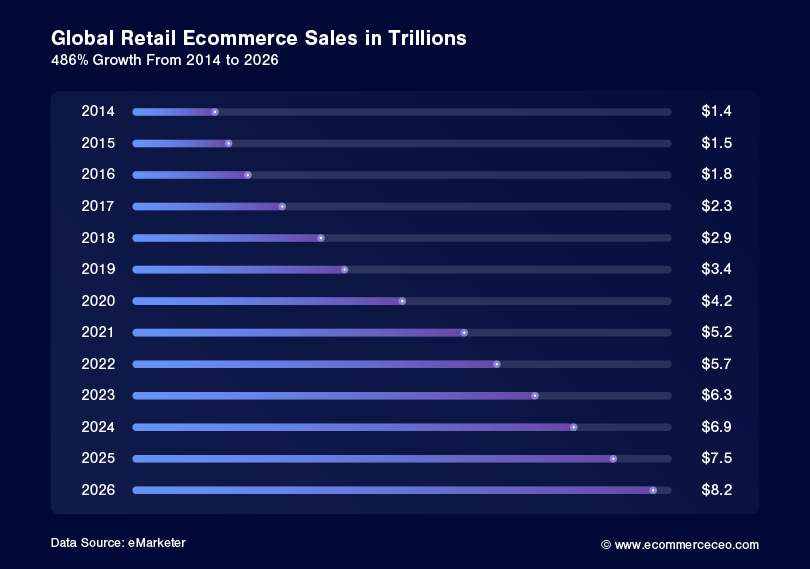
The year 2023 is estimated to bring record-breaking numbers for online spending. As ecommerce continues to move toward a customized consumer experience, online spending is expected to surpass 6 Trillion.
How Many People Buy Online?
If you shop online, you are in the majority. Reports show that more than 80% of the American population (or more than 260 million people) utilize the ecommerce market.
According to Statista, online buyers are expected to increase to 291.2 million by 2025.
Who Is Included In The Ecommerce Market?
So, where exactly are all these ecommerce sales taking place? The list is long – your neighborhood store, local retailers, non-traditional “retailers” like the Facebook marketplace, and those selling non-fungible tokens to top retailers (like those we’ll review below) make up the market.
The main products consumers shop for online is clothing, beauty, home goods, and electronics. With mobile devices in hand, retailers in the United States. and outside are creating digital environments that welcome online shoppers. And as we mentioned above, the digital demand keeps growing.
While small and mid-sized retailers make up a good part of e-com sales, we’re looking at the top online retail companies ranked highest.
Some of these companies offer in-store shopping in addition to their shopping site. And you’ll notice a couple of retailers that made their mark exclusively with an online store (the most notable being Amazon). The following list will give you the inside scoop on consumers’ preferred retailers and online shopping tactics.
Top Online Retailers in the U.S
Let’s jump into our list of popular online retailers in the U.S. These internet retailers are the top dogs in domestic ecommerce retail sales.
While some of these stores offer in-store shopping in addition to their shopping site, you’ll notice that our first retailer made their mark exclusively with an online store.
Amazon
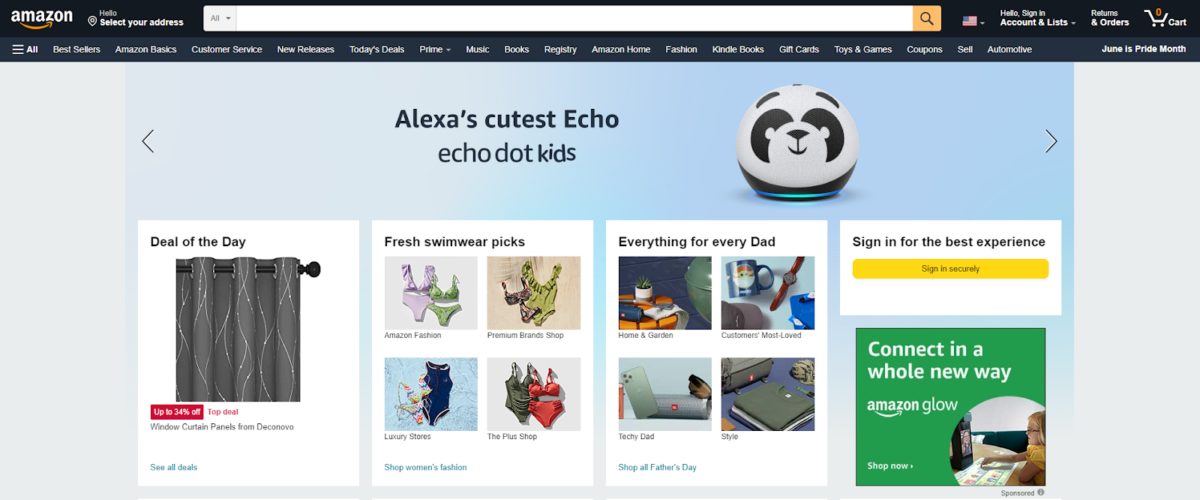
It’s hard to imagine a world without Amazon and its ingenious Amazon Prime (and Amazon Prime Day) offerings for consumers. This company started as an online book retailer in 1995 and has since grown into a huge online business that gives consumers and independent sellers unlimited possibilities. Their product categories are endless!
Amazon is at the top of online retailers thanks to the sheer sales volume. According to reports, Amazon’s market share makes up almost 50% of retail ecommerce sales (in the United States.).
Here is the breakdown of the data points. Shopping online (the U.S. only) last year generated approximately $1.3 Trillion. Of that number, Amazon sales were more than $514 Billion!
It’s no wonder that when you need to shop online, the first place you look is Amazon. You’ll get easy access to what you want, exclusive one-click payment options, and lightning-fast delivery.
Amazon has reinvented shopping strategies and is reaping the benefits of its impressive e-com sales.
Walmart
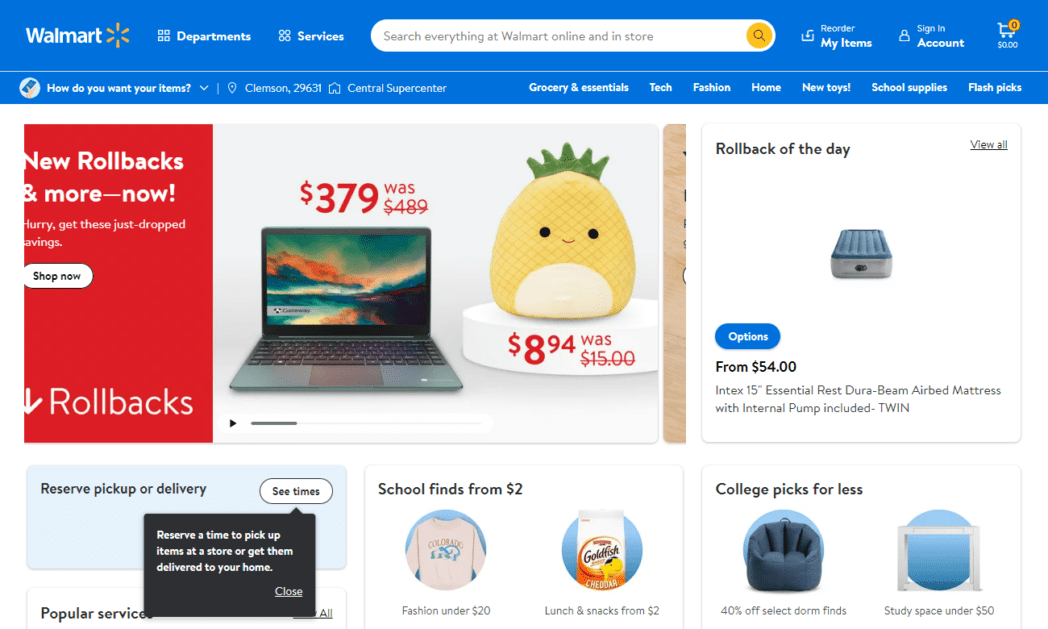
When it comes to online retailers, another big player is Walmart. Even though Walmart typically ranks second behind Amazon, its ecommerce market share is much smaller.
For the 2023 Fiscal Year, online shopping through the Walmart U.S., Walmart International, and Sams Club divisions was approximately $81 billion.
Of course, the difference between Walmart and Amazon is the accessibility of retail stores to support its ecommerce growth. Easy order pick-up for consumers is a big part of Walmart’s strategy.
According to Tom Ward, Walmart’s new chief U.S. ecommerce officer, the physical stores are intentionally transitioning to “shoppable fulfillment centers.” The ability of Walmart to support all customers, whether online, in-person, or just stopping by to pick up orders, is an advantage that will most likely support the next generation of consumers.
Walmart Resources: Sell on Walmart Marketplace
Apple

Coming in third place, Apple devices are well known by consumers (and loved). And while Apple provides in-store experiences in most major cities, online transactions are a significant part of company revenues, at approximately $31 billion.
In addition to known products that customers love, like the iPhone and iMac, Apple also offers Apple Podcasts Subscriptions.
Home Depot
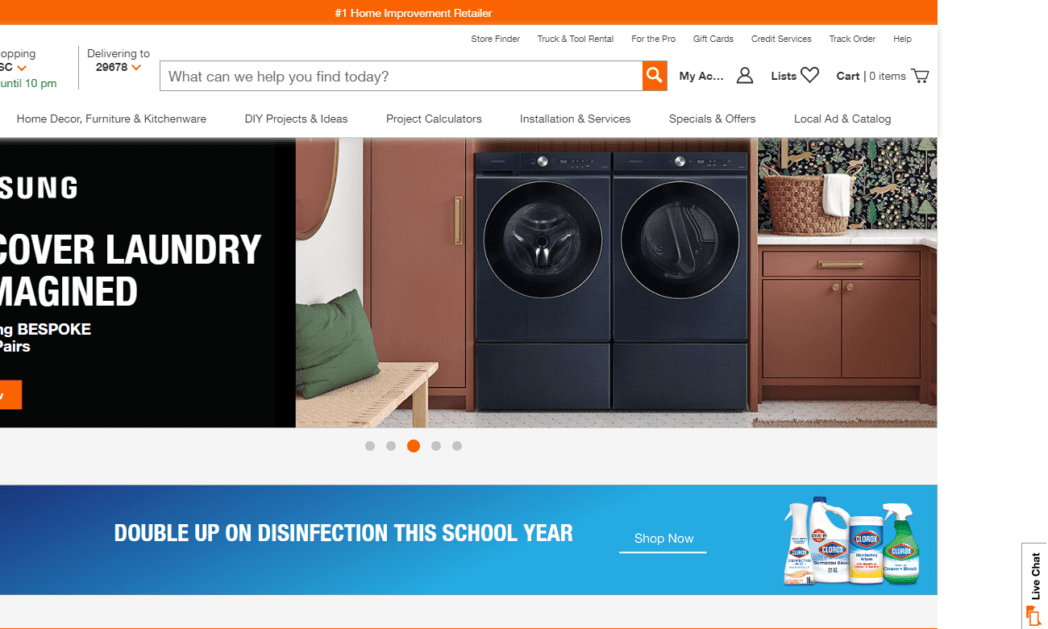
Home Depot is the go-to spot for DIYers. Consumers spent much time at home during the pandemic, so Home Depot saw an increase in online shoppers. But although it may surprise some, Home Depot held its own in the ecommerce arena, even before the COVID effect. Annual sales have topped $20 billion.
Like Walmart, Home Depot blends its online sales with retail stores that support consumers to get what they need. Home Depot has also invested in mobile apps that make it worth a trip to the store, such as the ability to conveniently check equipment availability and rent equipment online. Rather than driving to each location to investigate, consumers can confirm availability and make the purchase before heading to a store for pick up.
Target

Target is the retail company to watch, with online sales at approximately $19 billion. Thanks to the physical presence of Target stores, consumers can experience the online and in-person experience seamlessly. This mimics the model we’ve seen from other retailers and is proving to be one that consumers continue to utilize.
Target has made a name for itself in every category, from fashion, home goods, groceries, and electronics. It is the place to go when you want to splurge.
Order pick-up, same-day services, and drive-up options are here to stay and are expanding opportunities for retailers beyond traditional online stores.
Best Buy

The consumer electronics retailer we know and love, Best Buy comes in just behind Target with approximately $18 billion in online sales. According to RIS, Best Buy had “assumed digital penetration was going to increase,” even before the pandemic, resulting in four years of investments to improve the supply chain and allow consumers to decide how to fulfill their orders.
Wayfair
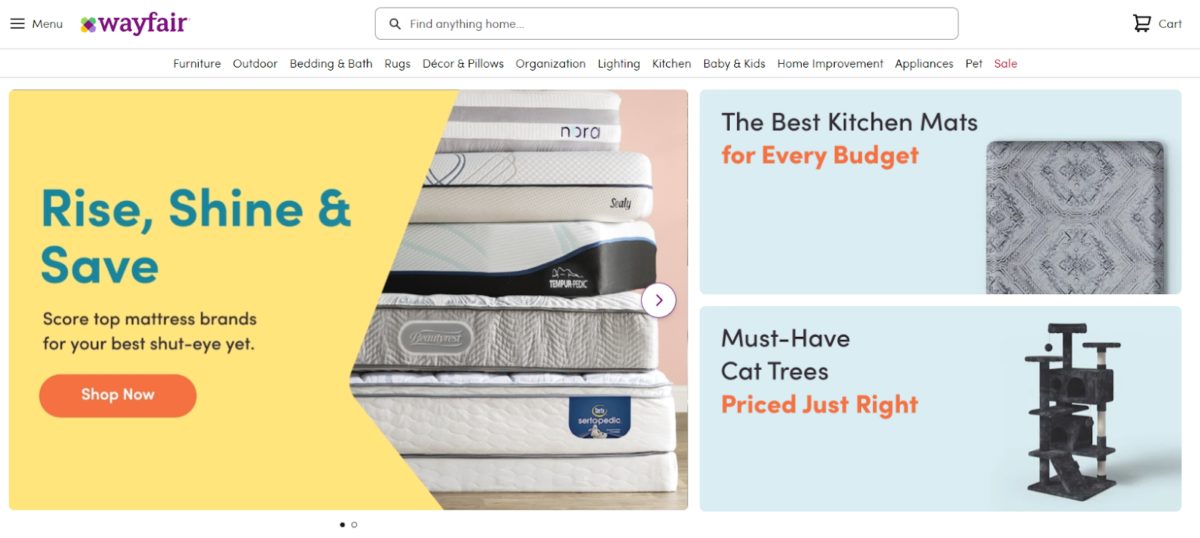
Wayfair holds a spot for top United States internet retailers, with approximately $14 billion in sales. Wayfair has committed to investing in “every area of the company,” including merchandise, logistics, and stellar customer service. Their technology allows shoppers to quickly and easily find what they need in a sea of more than 20 million items.
eBay
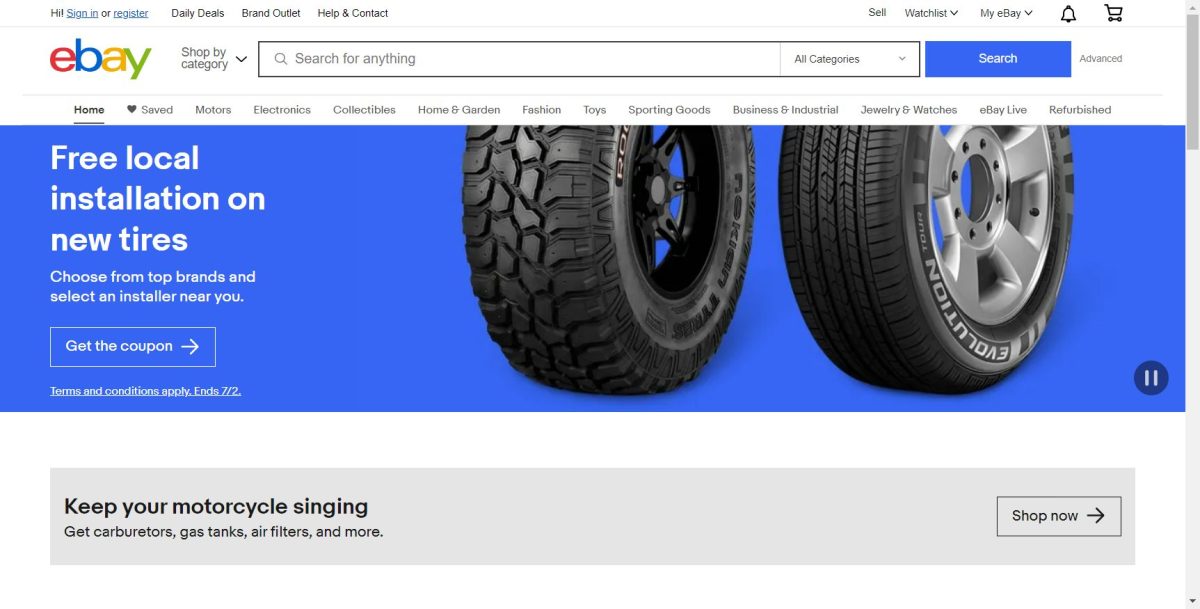
In ninth place is a surprising company, given that its central role is connecting buyers and sellers, rather than being an independent retailer.
Whether consumers want to find and buy a unique baseball card, personal care items, or even the all-new iMac, eBay most likely has what you need. And like Amazon, eBay isn’t heavily invested in physical retail space, so all sales come through online shoppers.
Since CEO Jamie Iannone joined eBay he has been “relentlessly focused on accelerating product innovation by harnessing the power of next-gen technology and creating a more seamless experience for sellers,” according to RIS. And if sales are any indication, eBay will continue to be a key player in the ecommerce space, with revenues close to $13 billion annually.
Costco
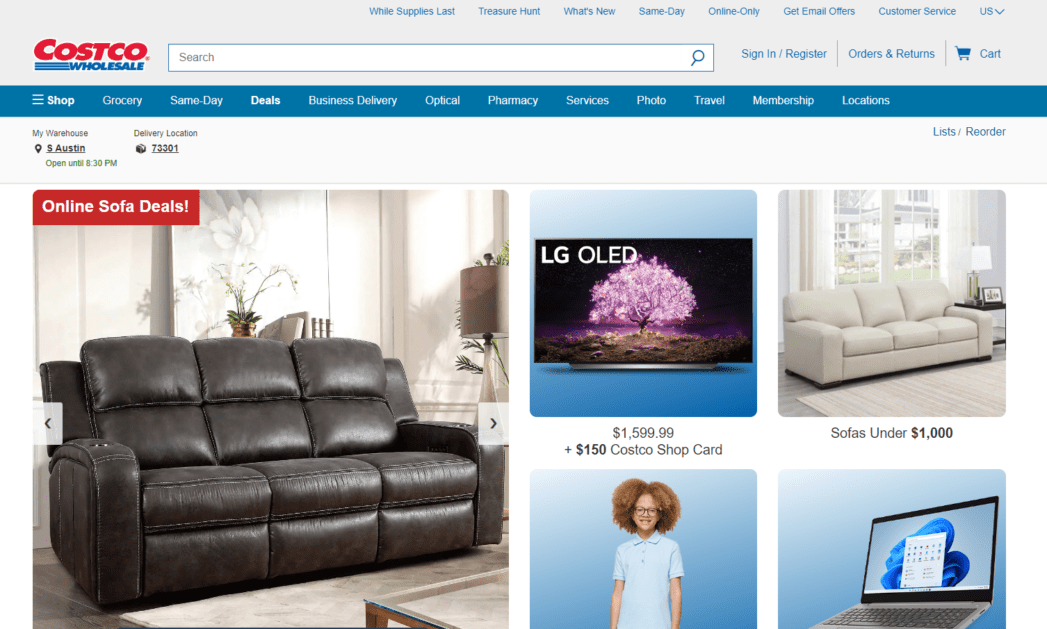
Costco and its unique membership program have been a successful model traditionally built on retail locations. Whether consumers wanted to buy personal care items, dietary supplements, or a new living room set, Costco was a big player for bulk items at warehouse pricing.
In addition to in-store options, Costco has seen consistent growth in its online revenue, capitalizing on delivery, in-store pick-up, and even unique partnerships with other delivery partners. These efforts have driven their e-com sales numbers to approximately $13 billion.
Kroger

It may come as a surprise that Kroger is next on the list, as this grocer isn’t an internationally recognized brand like some we’ve covered above. But Kroger’s impressive investments into automated warehouses (with a price tag of $50 to $100 million each) helped propel them to the top ten list with $13 billion in online revenue.
Etsy

Etsy is the go-to place for artisans and craftspeople. Being a marketplace where independent sellers can sell their wares, it has not raked in as much revenue as the other online competitors, but it’s a name everyone recognizes.
This store is the perfect website for personalized gifts and wacky creations you cannot find anywhere else. This website has come in at 11th for the United States retailers with annual revenue of just over $2 billion.
Non-US Based Companies
Curious about non-US-based companies that are making a mark online? The shortlist of big players (with impressive ecommerce numbers to back it up) includes Alibaba, Rakuten, and Ikea.
Alibaba Group

Alibaba is a China-based retailer with more than $126.49 billion annual turnover. This online platform is the largest business marketplace in the whole world. They own Alibaba.com and AliExpress. We’re talking millions (hundreds of millions) of users and businesses. It is one of the biggest online retailers in the whole world!
Ikea

Ikea has been around since 1943, making it one of the longest-running companies on our list. Founded in Sweden by Ingvar Kamprad at 17, Ikea has claimed its place in retail as a seller of household items like kitchen supplies, appliances, furniture, and decor. Online sales have made an impressive mark in addition to the traditional warehouses, surpassing more than $6 billion.
Rakuten

Rakuten is based in Japan and recently set a record of about $5 billion in revenue. Much like Alibaba, Rakuten is an online marketplace where consumers can find almost anything. And when a purchase is made through the online platform, users get cash back, further incentivizing online sales.
Learning From the Top Ecommerce Retailers
There’s a lot to be learned from studying the tools and tactics of ecommerce giants. The most successful entrepreneurs understand this principle well. They know that they must master the art of marketing before they can expect to reap the rewards of success. Who doesn’t want their online store to bring in billions of dollars of annual sales?
Want to stay up to date on the best ecommerce business and marketing strategies? Subscribe to our newsletter! We’ll provide you with the necessary knowledge for turning your business into a high-quality online store.










